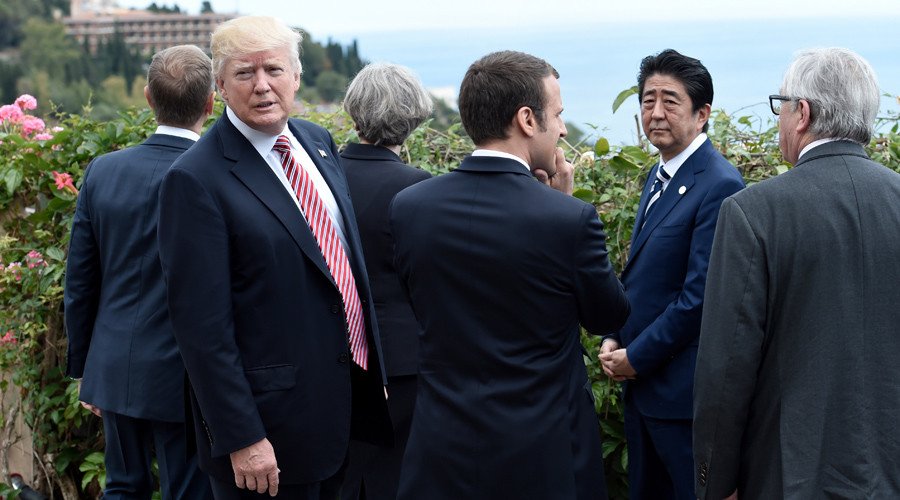Trump says Berlin must do more for NATO as German FM claims US leader puts Europe at risk
especiales

Donald Trump has slammed Berlin over its contribution to NATO and criticized the trade deficit between the two countries, after the German foreign minister claimed the US president’s current policy is weakening the West and putting Europe’s future at risk.
Berlin and Washington have traded barbs over numerous aspects of their relationship in the past few days.
On Tuesday, Trump responded to a barrage of recent statements from Berlin, saying in a tweet: “We have a massive trade deficit with Germany, plus they pay far less than they should on NATO & military. Very bad for US. This will change.”
@realDonaldTrump We have a MASSIVE trade deficit with Germany, plus they pay FAR LESS than they should on NATO & military. Very bad for U.S. This will change
Trump believes that European powers owe much to the US, particularly in the areas of defense and trade. During his election campaign, he consistently said Washington’s allies must shoulder the burden and financially support the US military presence in the region. Additionally, he accused Berlin of exploiting the benefits of American markets and overriding US carmakers.
The president’s tweet was met with caution in Berlin. “Donald Trump makes clear with his tweet that he views Germany as a political opponent,” Thomas Oppermann, head of the Social Democrats' (SPD) parliamentary faction, told reporters on Tuesday.
Martin Schulz, an outspoken Social Democrat and center-left chancellor candidate, said later on Tuesday that Trump was “the destroyer of all Western values.” He added that the US president was undermining peaceful cooperation of nations based on mutual respect and tolerance.
“One must stand in the way of such a man with his ideology of rearmament,” Schulz added.
“The short-sighted policies of the American government stand against the interests of the European Union,” German Foreign Minister Sigmar Gabriel said in Berlin, adding, “the West has become smaller, at least it has become weaker,” he told the Rheinische Post newspaper.
In an apparent reference to President Trump, he added that “anyone who accelerates climate change by weakening environmental protection, who sells more weapons in conflict zones and who does not want to politically resolve religious conflicts is putting peace in Europe at risk.”
The foreign minister later echoed previous statements by Chancellor Angela Merkel, who over the weekend sent shockwaves through Western capitals by arguing that Europe cannot rely completely on the US or Britain.
“We Europeans must really take our destiny into our own hands, of course in friendship with the United States, in friendship with Great Britain, with good neighborly relations wherever possible, also with Russia and other countries – but we have to know that we have to fight for our future and our fate ourselves as Europeans,” Merkel said in Munich at an event organized by the Christian Social Union, Bavaria’s sister party of the chancellor’s Christian Democrats.
“The times in which we can fully count on others are somewhat over, as I have experienced in the past few days,” she argued.
On Monday, Merkel clarified her much-debated speech, saying that transatlantic relationships were "of paramount importance" to Berlin, although Europe must also act independently.
"Transatlantic ties are of paramount importance to us... but the current situation gives more reasons for... us to take our destiny in our own hands," said Merkel, as quoted by AFP.
She also stressed that "Europe must become a player active in international affairs.”
The strongly-worded message and the shock it caused prompted Berlin to downplay the tone and content of Merkel’s speech.
@RT_com #Macron snubs #Trump for #Merkel & another arm wrestle follows https://on.rt.com/8csf

Her spokesman, Steffen Seibert, said on Monday the chancellor was a “deeply convinced trans-Atlanticist” who believes in the idea of Western unity.
Later in the day, Interior Minister Thomas de Maiziere echoed Seibert’s statements, saying: "I can only say transatlantic cooperation, especially in the security domain, is of paramount significance for our country."
Signs of discord between major European powers and Washington surfaced after the recent G7 summit in Italy. Merkel herself described her diplomatic encounter with the Americans as “very difficult, not to say very unsatisfactory.” Germany and France, two strong advocates of the landmark Paris climate change accords, oppose the Trump administration’s initiative to potentially pull out of the agreement.














Add new comment